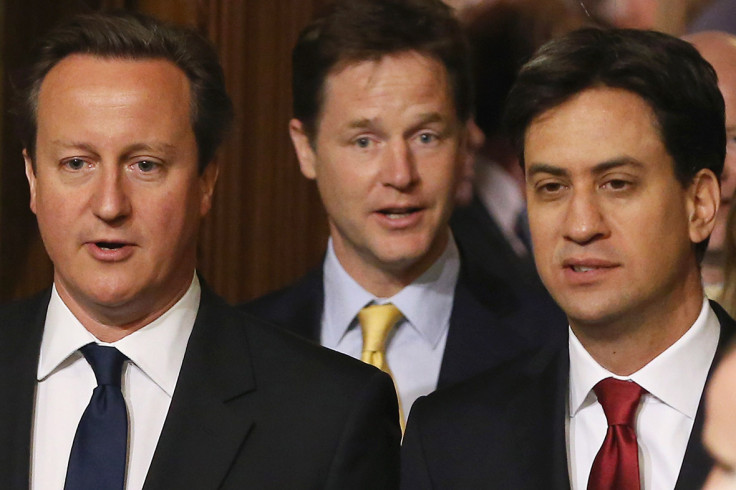Scotland Independence Referendum: What Happens in Westminster After the Vote?

Whatever the outcome of the Scotland referendum on Friday 19 September, it will have an instant impact on events in Westminster, where MPs are away for the party conference season that kicks off in earnest this weekend with the Labour rally in Manchester.
If the vote is for independence, it is impossible to overstate the panic and turmoil that will grip Westminster.
All three party leaders will be pitched into panic mode and their futures will be hanging in the balance.
Prime Minister David Cameron, who plans to be in his constituency, will be forced to rush back to Downing Street, if he has not already returned during the night.
Cameron, Labour leader Ed Miliband and Liberal Democrats' Nick Clegg will have to hit the TV studios to explain what went wrong, what they do now and whether they should quit. And to wish Scotland well.
Those demands for blood may well prove irresistible for Cameron and, quite possibly, Miliband too.
Their strongest lifeline will be the fact that they were at least united in their failure and it really will be a case of all for one and one for all.

It is also the case that Cameron's backbench critics may allow him to stay, keeping their powder dry in the belief the party is set to lose the general election anyway and that would be the time for a new face.
Cameron could table a motion of confidence in the Commons, secure in the belief the other parties would have to back him as they were all on the same side and should share the blame. But that would only serve to reveal the full extent of the opposition to him on his own benches, so it seems unlikely.
There is the very strong chance parliament will be recalled for an emergency debate, maybe as soon as 20 September. That normally only happens in the case of war or other national crises.
There may even be calls for the party conferences to be scrapped or curtailed, although there is too much money wrapped up in the events to make that a realistic option.
But the leaders will very likely spend less time than planned at their conferences. And, assuming they have not already gone, their big set-piece speeches may well decide whether they survive.
Meanwhile, Whitehall will have to start implementing detailed plans about exactly how to handle Scottish separation, with big questions about the currency, Trident, borders and so on needing to be addressed.
But then there are the unknown unknowns. Despite what they say, the parties must have been making contingency plans for a "Yes" vote and MPs across the Commons will be waiting with bated breath to see what they might have up their sleeves. If anything.
On the other hand, if Scotland votes "No", there will be an audible sigh of relief from all the big parties. But do not expect any celebrations - the contest has been bruising and career-threatening, and the parties have given so much away, it will be a very limited victory.
We can expect to see all three Westminster leaders making conciliatory statements and promising to immediately get down to the work of hammering out the details of their promised extra powers to Holyrood.

There will also be talk of that "constitutional convention" to look at a new deal for the entire UK.
There will still be some demands for a recall of parliament to discuss the wider constitutional issues raised by the promise of extra powers to the Scottish parliament.
That is likely to be resisted but all eyes will turn to the party conferences where the leaders' big speeches, planned as their general election campaign launches, will be dominated by the constitutional issues.
Cameron, in particular, will face some serious questions from his own backbenchers over his decision to, in effect, give Scottish First Minister Alex Salmond the "devo max" he had always wanted as a consolation prize.
In any case, both his and Miliband's leaderships have been weakened by the campaign.
The greatest problem they will face will be the attempt to get their general election campaigns back on track and refocus on the economic recovery and cost-of-living crisis.
That will be easier with a "No" vote but, this close to the poll, it is hard to see how the issue will not hang over the entire campaign.
© Copyright IBTimes 2025. All rights reserved.






















